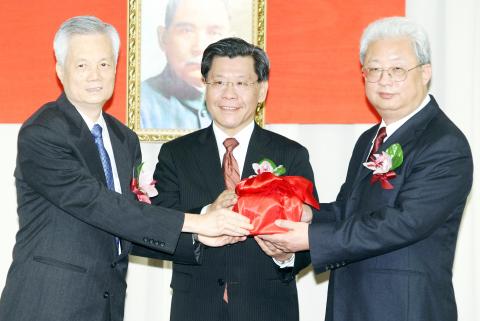Tatung University president Chu Wen-chen (朱文成) yesterday became the first outsider to become Taiwan Power Co’s (Taipower, 台電) president in the state-run company’s 60-year history, but he is facing a long list of challenges.
These challenges include the controversial construction of the Fourth Nuclear Power Plant in Gongliao District (貢寮), New Taipei City (新北市), losses of NT$193.6 billion (US$6.56 billion) and the rising cost of fuel and electricity.
“Taipower must operate more efficiently to rebuild its broken image,” Vice Minister of Economic Affairs Francis Liang (梁國新) said yesterday at a handover ceremony.

Photo: CNA
“We expect Chu to run Taipower from a new perspective and with a new approach,” Liang said.
Chu replaced Lee Han-shen (李漢申), who retired yesterday.
Chu said he agreed with Lee’s business philosophy that Taipower should operate effectively to achieve sales growth without being hindered by a bureaucratic system.
“Taipower is in the service sector, not the manufacturing sector. Taipower’s duty is to provide satisfactory service to its customers. The company should work to achieve this goal,” Chu said.
Chu said his priority after taking office is to improve communication with the public.
Taipower needs to publicize information about electricity supplies as soon as possible to clarify misunderstandings, he added.
“Taipower has to fix many of the ways its business performs, but it was never as bad as some have claimed,” Chu said.
Asked by reporters for his views on the Fourth Nuclear Power Plant, Chu said: “Taipower will seek alternative solutions if a referendum shows a majority of people do not want a new nuclear power plant.”
“We don’t mean to threaten the society. The problem is that if the Fourth Nuclear Power Plant does not become operational, everyone will have to suffer an electricity supply constraint, but we are confident we could solve the problem,” Chu said.
Chu said he would demand that Taipower employees do not collude with contractors, adding that if anything illegal is discovered, the company would report the matter to prosecutors immediately.

TARIFFS: The global ‘panic atmosphere remains strong,’ and foreign investors have continued to sell their holdings since the start of the year, the Ministry of Finance said The government yesterday authorized the activation of its NT$500 billion (US$15.15 billion) National Stabilization Fund (NSF) to prop up the local stock market after two days of sharp falls in reaction to US President Donald Trump’s new import tariffs. The Ministry of Finance said in a statement after the market close that the steering committee of the fund had been given the go-ahead to intervene in the market to bolster Taiwanese shares in a time of crisis. The fund has been authorized to use its assets “to carry out market stabilization tasks as appropriate to maintain the stability of Taiwan’s

STEEP DECLINE: Yesterday’s drop was the third-steepest in its history, the steepest being Monday’s drop in the wake of the tariff announcement on Wednesday last week Taiwanese stocks continued their heavy sell-off yesterday, as concerns over US tariffs and unwinding of leveraged bets weighed on the market. The benchmark TAIEX plunged 1,068.19 points, or 5.79 percent, to 17,391.76, notching the biggest drop among Asian peers as it hit a 15-month low. The decline came even after the government on late Tuesday authorized the NT$500 billion (US$15.2 billion) National Stabilization Fund (國安基金) to step in to buoy the market amid investors’ worries over tariffs imposed by US President Donald Trump. Yesterday’s decline was the third-steepest in its history, trailing only the declines of 2,065.87 points on Monday and

TARIFF CONCERNS: The chipmaker cited global uncertainty from US tariffs and a weakening economic outlook, but said its Singapore expansion remains on track Vanguard International Semiconductor Corp (世界先進), a foundry service provider specializing in producing power management and display driver chips, yesterday withdrew its full-year revenue projection of moderate growth for this year, as escalating US tariff tensions raised uncertainty and concern about a potential economic recession. The Hsinchu-based chipmaker in February said revenues this year would grow mildly from last year based on improving supply chain inventory levels and market demand. At the time, it also anticipated gradual quarter revenue growth. However, the US’ sweeping tariff policy has upended the industry’s supply chains and weakened economic prospects for the world economy, it said. “Now

An employment discrimination lawsuit against contract chipmaker Taiwan Semiconductor Manufacturing Co (TSMC, 台積電) might soon be expanded after a hearing in a federal court in San Jose, California, on Tuesday to add 15 plaintiffs to the case. According to a court document, the lawsuit, which was refiled in November last year as a form of a class action with 13 plaintiffs in California, wants to add 15 plaintiffs from Arizona, where TSMC is building up its wafer fab capacity. TSMC first committed between 2020 and last year to invest US$65 billion in three advanced wafer fabs in Arizona. It then pledged an